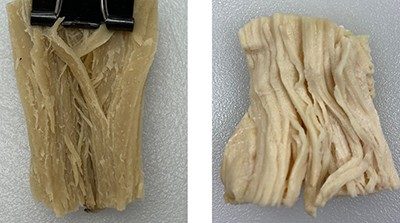FOR IMMEDIATE RELEASE
ACS News Service Weekly PressPac: June 22, 2022
Human cells take in less protein from a plant-based meat than from chicken
“Characterization and Cellular Uptake of Peptides Derived from In Vitro Digestion of Meat Analogue Produced by a Sustainable Extrusion Process”
Journal of Agricultural and Food Chemistry
Many people have now embraced the plant-based meat movement. Plants high in protein, such as soybeans, are common ingredients, but it’s been unclear how much of the nutrient makes it into human cells. In ACS’ Journal of Agricultural and Food Chemistry, researchers report that proteins in a model plant-based substitute were not as accessible to cells as those from meat. The team says this knowledge could eventually be used to develop more healthful products.
Consumers can now buy almost any type of alternative meat, from ground beef to fish sticks. To mimic the look and texture of the real thing, plants are dehydrated into a powder and mixed with seasonings. Then, the mixtures are typically heated, moistened and processed through an extruder. These products are often thought of as being more healthful than animal meats because the plants used to make them are high in protein and low in undesirable fats. However, lab tests have shown that proteins in substitutes don’t break down into peptides as well as those from meats. Osvaldo Campanella, Da Chen and colleagues wanted to go a step further and see if human cells can absorb similar amounts of peptides from a model meat alternative as they can from a piece of chicken.
The researchers created a model meat alternative made of soy and wheat gluten with the extrusion process. When cut open, the material had long fibrous pieces inside, just like chicken. Cooked pieces of the substitute and chicken meat were then ground up and broken down with an enzyme that humans use to digest food. In vitro tests showed that meat-substitute peptides were less water-soluble than those from chicken, and they also were not absorbed as well by human cells. With this new understanding, the researchers say the next step is to identify other ingredients that could help boost the peptide uptake of plant-based meat substitutes.
The authors acknowledge funding from the College of Food, Agricultural, and Environmental Sciences at The Ohio State University.
###
The American Chemical Society (ACS) is a nonprofit organization chartered by the U.S. Congress. ACS’ mission is to advance the broader chemistry enterprise and its practitioners for the benefit of Earth and all its people. The Society is a global leader in promoting excellence in science education and providing access to chemistry-related information and research through its multiple research solutions, peer-reviewed journals, scientific conferences, eBooks and weekly news periodical Chemical & Engineering News. ACS journals are among the most cited, most trusted and most read within the scientific literature; however, ACS itself does not conduct chemical research. As a leader in scientific information solutions, its CAS division partners with global innovators to accelerate breakthroughs by curating, connecting and analyzing the world’s scientific knowledge. ACS’ main offices are in Washington, D.C., and Columbus, Ohio.
To automatically receive press releases from the American Chemical Society, contact newsroom@acs.org.
Note: ACS does not conduct research, but publishes and publicizes peer-reviewed scientific studies.
Media Contact
ACS Newsroom
newsroom@acs.org

View larger image

